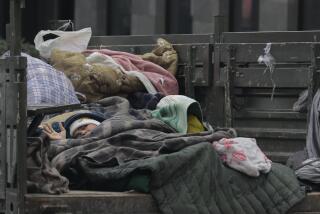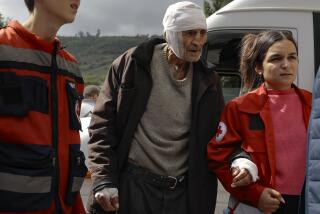New Autonomy Pledged for Soviet Minorities : Added Political, Economic, Cultural Freedoms Seen, but Gorbachev Decries Armenian Protests
- Share via
MOSCOW — Soviet leader Mikhail S. Gorbachev on Tuesday promised the country’s major ethnic groups greater political, economic and cultural autonomy in response to growing demands that they be allowed to make more of their own decisions without asking Moscow’s permission.
But Gorbachev, opening the special Communist Party conference on political and economic reforms, sharply criticized Armenian protests demanding that the disputed region of Nagorno-Karabakh be transferred from the southern Soviet republic of Azerbaijan to neighboring Armenia.
He said that four months of demonstrations, including general strikes in both Nagorno-Karabakh and Armenia, were an abuse of the country’s increased democracy and that they had jeopardized the broader reforms now under way here.
Underscores Unity
Gorbachev, who called on the conference to discuss the ethnic question, also said that the changes he envisions in the status of the country’s 15 constituent national republics would be based on the continuing political and economic integrity of the Soviet Union.
‘Tangled Problems’
“We have seen for ourselves lately how tangled the problems of inter-ethnic relations can become,” he told the conference, referring not only to the Nagorno-Karabakh dispute but to more than a dozen other recent minority problems around the country. “This means that we must do our utmost to protect and nurture our peoples’ brotherhood and friendship. There is simply no other way, no other rational alternative.”
The current problems, Gorbachev made clear, have put the long-ignored ethnic issue high on the Soviet leadership’s agenda in the hope that further, probably more serious, conflicts could be averted.
Increased democratization and glasnost , or political openness, he said, have put the spotlight on problems whose importance has not always been taken into due consideration--issues of language, culture, literature, art, historic heritage and environmental protection.
‘Ethnic Self-Awareness’
“It is natural for the development of our multi-ethnic state to be accompanied by a growth of ethnic self-awareness,” Gorbachev said. “But since the new needs arising in this connection were not always treated with the attention they deserved, some issues began to develop complications and acquire a nationalistic aspect.
“In principle, however, they could have been settled normally, without providing a pretext for all sorts of speculations and emotionally charged outbursts. . . . And to try to set people of different ethnic backgrounds against each other, to sow mistrust and hostility between them, is a grave offense against one’s own people and socialist society, as well as against the law.”
Yet Gorbachev appeared sympathetic to many of the complaints from the country’s ethnic minorities, which number more than 100 and which have often been overwhelmed by the Russians, who predominate in the party and government.
“Certain collisions may occur,” he said, noting the country’s ethnic complexity, “and they can only be settled one way--by ensuring, with the existing state structure of our union, the greatest possible accommodation of the interests of each national and nationality and of the entire community of the Soviet Union’s peoples.”
As part of broader reforms under way here, he said, the party will consider requests, such as those from the prosperous Baltic republics of Estonia, Latvia and Lithuania, for the right to plan their own economic development.
The party and government would also re-examine the laws and regulations governing relations between the central government and the republics, to update them, spelling out the republics’ rights and bringing them to “the level of our democratic development.”
Another proposal put forward by Gorbachev would give the Supreme Soviet, the national Parliament, clear authority to protect the rights of the constituent republics, which are based on the largest nationalities.
Mandates Seeking Autonomy
The three Baltic republics sent delegations to the party conference with mandates to seek unprecedented autonomy for them--”as much as we could have, virtually our independence restored, and still stay within the Soviet Union,” as an Estonian delegate commented.
The party’s policy-making Central Committee had earlier announced plans for a special meeting of its own to discuss the country’s ethnic problems, but Gorbachev said the issue was too urgent to postpone.
In Nagorno-Karabakh, meanwhile, the monthlong general strike continued at a reduced level, according to the Communist Party newspaper Pravda, which reported that about 50% of the workers had returned to their jobs Monday.
Expression of Confidence
Party leaders had appealed over the weekend for a return to work pending the resolution of the region’s future by the Supreme Soviet. They had said that such a move would constitute an expression of confidence in perestroika , or restructuring, and asked for an end to the strike before the party conference began.
The region’s request for incorporation into Armenia will be decided by the Supreme Soviet, officials said. Armenia has endorsed the proposal, while Azerbaijan has opposed it.
According to official figures, 35 people have been killed in the strife over the last four months. Most were Armenians living in the Azerbaijani city of Sumgait.
Foreign newsmen have been barred from traveling to Nagorno-Karabakh since February, and Armenia and Azerbaijan have also been closed to Western correspondents.
More to Read
Sign up for Essential California
The most important California stories and recommendations in your inbox every morning.
You may occasionally receive promotional content from the Los Angeles Times.













